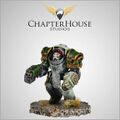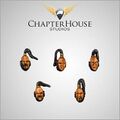ChapterHouse Studios
| ChapterHouse Studios | ||
|---|---|---|
| Website | http://chapterhousestudios.com/ | |
ChapterHouse Studios is a miniatures company that produces miniatures and bits meant to be used with Games Workshop's Warhammer 40,000 and Warhammer Fantasy lines. Rather than dancing around the issue and saying "compatible with major brands of 28mm miniatures (wink, wink)", ChapterHouse's products are directly named and organized by what GW factions and models they're meant to go with.
Lawsuit from Games Workshop

Games Workshop got fed up with this and filed a lawsuit against them when they started making models for units that GW had named in their codexes but not depicted in any art or models, most notably the Tyranids' Mycetic Spore. The lawsuit went on for years, but finally ended mostly in ChapterHouse's favor -- since Games Workshop had never actually produced any depiction of many of the units in question, it was ruled that ChapterHouse (and anyone else) weren't violating any copyrights by making their own models (it would be like Games Workshop trying to bring a lawsuit against every person in the world who made conversions for Warhammer).
However on balance, GW took around 200 specific articles of alleged copyright infringement to court with them, and won about 30% of those. Forcing ChapterHouse to retire many of their own models, as simply making "variations" (such as female versions of existing GW models like Farseers & Aspect Warriors) still counts as infringment. Plus ChapterHouse was ordered to pay damages for these breaches of copyright and pay court costs, which they were still appealing as of early 2014.
In a display of impotent petulance, Games Workshop took out their anger at the ruling on the Tyranids by stripping out the Mycetic Spores as well as the Doom of Mal'antai and the Parasite of Mortrex, which also had models made for them, and if the renaming of the Imperial Guard to the far more copyright-friendly "Astra Militarum", (not to mention the removal of several other ICs and units which never had models from their codex) is any indication, GW's lawyers are still bitter about it (though Games Workshop still love Space Marines too much to rename them, despite the 'Spots the Space Marine' situation). Of course, all of that could have been avoided if they were a little less lazy about giving characters both rules and models, but that would involve too much effort for them.
All in all, this is generally a good example of Intellectual Property Law at work: If you want to earn a profit by using someone else's IP, then you have to either have to License it from the owner (which GW won't give to competitors) or find a way to release original products that the owner has never released or depicted in the any media (that also goes for creating models based on drawings ie: "Derivative Works"). Also, if the owner doesn't want to find someone filling a niche they themselves could be filling, then they shouldn't create gaps in their own product range.
Result
In October 2014 Chapterhouse shut down their website after having their assets frozen by Games Workshop.
On 14 November 2014[[1]] the case was settled between the companies. The appeals from both sides were dismissed "with prejudice" (cannot be re-litigated) in a "Joint Dismissal" (meaning they both agreed to it): The $25,000 damages sought by GW were waived and the asset freeze was lifted. Each side has to pay its own legal fees (Chapterhouse was represented pro bono, of course).
On 18 November 2014 Chapterhouse announced via Facebook that "the web store will be up and going by the end of the week and I will ship out any orders that were not disputed this week as well. Hopefully the site will be able to stay profitable and I am hoping the defense lines will sell as well as some new products as well."
Discussion
Some would argue that Chapterhouse should have seen the lawsuit coming, since they based a huge portion of their business model as "aftermarket bits" specifically for GW products, using GW models/components in their advertising and even using GW names such as "pre-heresy terminator" for their products, which was an incredibly risky venture - akin to playing with fire - especially considering that most people know how litigious GW is over their IP.
The earlier rulings regarding specific instances of infringment still stand, since this was only an agreement on the damages appeal (and not the original case); therefore GW still cannot "own" a copyright on something that they have never depicted or produced themselves, so still don't expect the recent attitude of "no model = no rules" to lessen off any time soon.
Ultimately whether this is bad or good is up to you the reader, since it means that GW from now on will at least have models for the things that they present in their books rather than leaving giant gaps for over a decade (eg: Decapitator).
Some fear that it will now be more difficult to find alternative parts for GW models anymore (meaning you'll have to go to them exclusively for your kit-bashing needs) unless you can find something in another range that fits your chosen model "coincidentally" *wink wink* . In fact even saying it fits with specific third-party products is actually fine (like modified car parts), you still can't advertise your own products using someone else's products and trademarks, the product has to stand on its own, but that's not really any change in IP law at all, so things continue as normal.
Stopping this from happening to YOU
As mentioned earlier, you CANNOT be sued for creating your own conversions of anyone's models. So long as they are for non-commercial use.
This is actually broad IP law and applies to more than just models, which is why you can create your own artwork and fan-fic stories based off of other people's products (called "Derivative Works") as long as what you are doing constitutes "fair use" and that you aren't doing it to make a profit. Even this gets a bit sketchy. You ARE allowed to sell the things that you make based on the law of possession, but you cannot open a business based on selling your conversions.
Technically, just because you make your own artwork, story or model conversion, that does't actually mean that you OWN the copyright to that item, you just have ownership of the property that is actually in your possession at the time. Some people (particularly fanfic authors) tend to think that because they made a thing that they have legal rights with respect to it, this truly isn't the case...
So don't go acting like you can do anything you want with it, since elements of it will belong to the original owner, you only hold the rights to the parts that made it distinctive. That's how things like 50 Shades of Gray exist, having been a conversion of Twilight, but only made acceptable (remember we're talking legally, not morally) for commercial resale by removing all the names and associations with the former piece of work
If you want to go into business as a conversions-kit company or a model-painting company, then don't use someone else's IP to advertise your products and don't target someone else's specific IP as your sole business model, you need licenses to do things like that. You're better off keeping it generic, like: "conversion kits compatible with most 28mm models" or "painting services for tabletop wargaming models".

